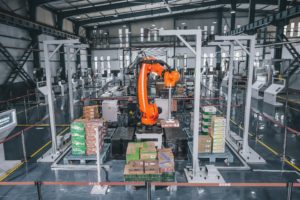Mission Focus: Manufacturing and Supply Chains

Global industry and manufacturing are directly responsible for upwards of 30% of global greenhouse gas (GHG) emissions, as well as being a major source of pollution and a significant and ongoing impact on our natural ecosystems. Read on to find out why Manufacturing and Supply Chains is one of the four focus areas for Zinc’s next Venture Builder: transforming the industries that have the most impact on our environmental crisis.
Manufacturing and Supply Chain Emissions
Manufacturing, along with its accompanying supply chains, represents both the greatest challenge and opportunity to reach net zero. Some estimates point to 43% of GHG emissions coming from industry and its supply chains, without taking into account agriculture and land use. And yet it remains one of the most difficult challenge areas due to the need to retrofit, upgrade and replace existing equipment, at the same time as requiring the transformation of supply chains that are often opaque and difficult to disentangle.
Those supply chain emissions—the result of a labyrinth of contributing pathways across borders and sectors, involving numerous stakeholders—are thought to be on average eleven times higher than operational emissions. To understand the environmental impact of a company’s activity, therefore, the entire value chain must be engaged and assessed for total impact. But the complexity of this problem also has its upsides: network effects mean that as companies curb their emissions, others will need to do the same upstream and down, having a significant cumulative effect.
Electrification, Carbon Capture and Efficiencies
There are many potential solutions to manufacturing and supply chain emissions, from making efficiency measures to radical shifts in the way we make and consume products through initiatives such as the circular economy. It is thought that upgrades and replacements could save around 25% of energy efficiency; and innovation might even make up to 20% of additional savings. Cross-cutting technologies such as efficient motors and electronic control systems, along with cross-cutting measures such as reducing air or steam leaks are very promising.
Most excitingly, digitalisation is thought to have a great potential to contribute to CO2 reduction in manufacturing and its supply chains. One study has suggested that digital technologies alone could contribute to a staggering 50% reduction in manufacturing emissions. This could be achieved by fostering systemic approaches and collaboration: the potential to share information, waste and waste management facilities, heating, and cooling, etc.
Other options for reducing emissions abound, including
- Resource efficiency: reducing the flow of materials into the economy by using products more efficiently and for longer. i.e. moving towards a circular economy
- Material substitution: switching from high-embodied carbon materials to low-embodied ones.
- Energy efficiency: fuel switching to hydrogen, electricity and bioenergy.
- Carbon capture and storage (CSS) at industrial point-sources. CCS is likely to be increasingly important for manufacturing processes that can’t be addressed simply by switching to low- or zero-carbon energy, such as those arising from chemical processes such as the calcination of limestone in cement production.
In How to Avoid a Climate Disaster (2021), Bill Gates breaks the numerous possibilities into four key options:
- Electrify every process possible.
- Get that electricity from decarbonised power.
- Use carbon capture to absorb any remaining emissions.
- And use materials more efficiently.
Each of these areas, he repeatedly emphasises, will take a lot of innovation, and although some technologies already exist that can help, we don’t yet know which will be the breakthrough ones, or what new innovations may emerge.

Zinc’s Approach
At Zinc, we bring together around 70 talented individuals from academia, technology, business, the arts, and entrepreneurship to explore these problems in depth and find new innovations. Their experiences may differ, but they are united by the same passion to build businesses that can solve the world’s most pressing social and environmental problems. Ventures will receive up to £250,000 investment to propel their business, as well as access to Zinc’s network of 100+ Visiting Fellows: experts and advisors from business, academia, design, technology and the public sector. Join our next Venture Builder to transform the transport sector through early stage innovation.
Do you know someone working in manufacturing or supply chains? Or people with business, academic, engineering or technical expertise that want to make a difference in these sectors. Help spread the word by sharing the mission manifesto, encouraging people to sign up to a meet and greet, or click here to apply.
Join the Zinc community
Stay up to date with all Zinc updates and future posts as part of our fast growing community.
Featured Resources
Zinc Impact Report 2024
Zinc’s mission is to make the UK the best place to successfully start a venture which can have a massive impact on the health of people and the planet.
Increasingly, we are building deeper science ventures that serve global, industrial customers in environment and health, giving access to impact at a global scale.
Our 2024 Impact Report explores the challenges that need to be tackled to empower and enable talented founders from around the world to solve critical health and environmental challenges at scale, from here in the UK.
This report showcases success stories from the Zinc portfolio, and highlights how Zinc – and our growing community of hundreds of Founders, Fellows, Coaches, Partners and Funders – are working together to build a world-leading “Science-for-Impact” ecosystem for inception stage ventures in health and environment.
Impact Report 2023
We started Zinc with the hypothesis that missions are an effective way to attract highly ambitious, talented and experienced groups of innovators, who might not recognise themselves as “classic entrepreneurs” but are ready and able to start a new commercial and successful venture to tackle some of our most pressing societal issues.
The world has overcome the sorts of challenges we face today when it has adopted a mission-based approach to the biggest problems and brought together world-class talent to invent and innovate, e.g: NASA and landing a man on the moon, the LSE blueprinting the British welfare state, or the Gates Foundation aiming to eradicate diseases.
On this basis and assumption, we designed Zinc as a new mission-based Venture Builder — a place where global talent, ‘impact makers’, can join to experiment and develop new solutions to our most pressing societal issues.

